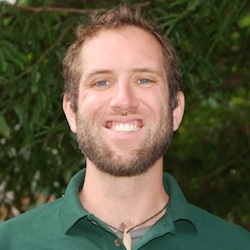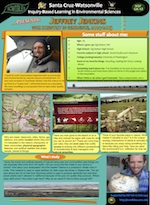 People’s understanding of the environment and its resources have interested me from a young age. Moving from suburban southern California to rural Washington state exposed me to competing perspectives of nature. In the northwest different land users, including fisheries, timber production, homesteading, rural tourism and outdoor recreation competed for the value of the landscape. There, multiple use was more than strip malls, car dealership, and office buildings, but at the same time these commercial uses connected the resources of the periphery with the production of the city.
People’s understanding of the environment and its resources have interested me from a young age. Moving from suburban southern California to rural Washington state exposed me to competing perspectives of nature. In the northwest different land users, including fisheries, timber production, homesteading, rural tourism and outdoor recreation competed for the value of the landscape. There, multiple use was more than strip malls, car dealership, and office buildings, but at the same time these commercial uses connected the resources of the periphery with the production of the city.
I studied human-environment geography and urban design as an undergraduate at the University of Washington in Seattle, a city whose music and people in the decade before helped to shape the nation’s cultural landscape. A study abroad opportunity in the Netherlands is where I experienced everyday life centered around the bicycle, a transportation technology used to simplify our lives and has led to a much healthier society. I moved to Sacramento after graduation where I worked in regional planning related to exurban growth and military base expansion. I soon realized how the American way of life was compromising itself and decided to take a job in Chile where I taught English at a Catholic school. Subsequently I traveled throughout the Andean countries via coach bus where I began to understand a certain type dependency pervasive throughout the global south which could simply be put as an equal and opposite recreation to the level of independence we as Americans have been afforded in our daily lives. I spent the next year authoring a travelogue about the cultural landscape of resource dependency that I saw throughout highland Bolivia: extraction, pollution, poverty, and lack of access to food. I decided I needed a framework to understand the history of political economic structures which have led to the mining of inputs for our cultural ast the expense of others and began a Master’s in geography at California State University – Chico with a focus in rural development. I spent the next two years researching how the water resources and populations of communities in a high mountain region of Bolivia, the Uyuni salt flats, where being transformed by quinoa production and silver extraction which served North American and European markets.
Today I continue my interest in regional dynamics of resource extraction though have shifted my gaze back home to the American west. The western United States has a legacy of resource extraction, including the post-WWII industries of strategic metal production for industrial needs. Industries like uranium, copper, and now rare earth elements provide the material inputs to our modern day society. Whether it be energy production, electrification or renewable energy technologies, our very culture is historically contingent on these resources and the technologies that have emerged from their availability. Currently, I’m working to finish up field work for my dissertation which looks at a regional case study of rare earth mining development in the Black Hills of Wyoming. As part of this research, I’m interested in understanding how stakeholder perspectives related to access to natural resources and perceived environmental impacts of mining are shaped by historical legacies and differing epistemologies, or world views. The politics of the environment, and its resources might seem like a simple matter in suburban California though when you think about it the entire reason we’re California Dreamin’ is because other regions in rural America and throughout the world have incurred the impacts from our hi-tech and renewable energy way-of-life. As one interview who happened to be a wildlife painter put it, “Coming outside of California to see how people view the environment, well that’s a novel idea!”
Contact Jeff: jsjenkin@ucsc.edu and Website
